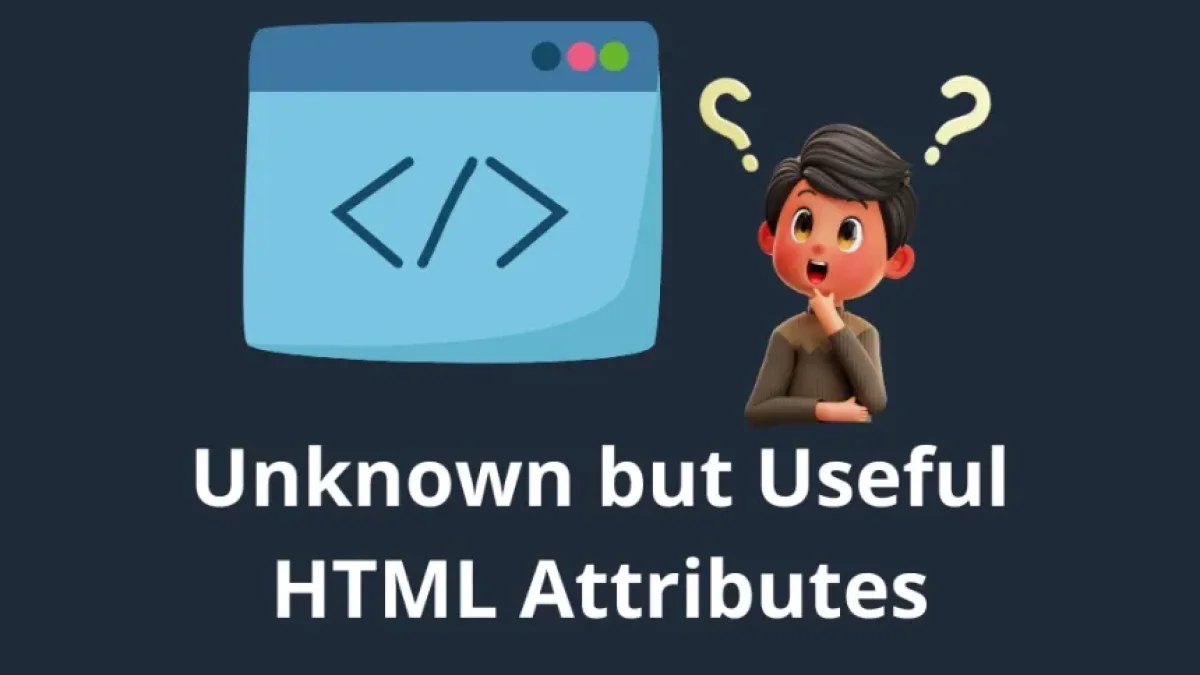Unknown but Useful HTML Attributes


In the vast world of web development, HTML attributes play a crucial role in the configuration and behavior of elements. While many developers are familiar with common attributes such as id, class, and src, there are other lesser-known attributes that can improve the functionality and accessibility of a website. This article will explore some of these little-known but extremely useful HTML attributes, optimizing their use to improve user experience and search engine optimization (SEO).
Accessibility Attributes
aria-label
The aria-label attribute provides an accessible label for an element, which can be useful if the element's text is not descriptive. This attribute is commonly used on buttons and links.
<button aria-label="Close">X</button>
Benefits:
- Improves accessibility for users of assistive technologies.
- Allows screen readers to announce actions or functions more clearly.
role
The role attribute is used to define the purpose of an element in the user interface. This is especially useful for non-standard elements that do not have a predetermined semantic behavior.
Read also
<div role="navigation">...</div>
Benefits:
- Improves understanding of page structure by screen readers.
- Increases overall accessibility of the website.
Form Attributes
autocomplete
The autocomplete attribute allows browsers to remember form information, improving the user experience by automatically completing pre-populated fields.
<input type="text" name="email" autocomplete="email">
Benefits:
Read also
- Increases the efficiency of form completion.
- Helps reduce form abandonment rate.
novalidate
The novalidate attribute is used in forms to disable client-side validation, allowing the form to be processed without restrictions.
<form novalidate> <input type="text" required> </form>
Benefits:
- Useful in cases where validation is handled server-side.
- Prevents errors in complex forms where validation can be problematic.
Multimedia Attributes
preload
The preload attribute is used on multimedia elements to specify whether the browser should load the resource in advance. This is especially useful for video and audio.
<audio preload="auto" src="audio.mp3"></audio>
Benefits:
- Improves user experience by reducing loading times.
- Can optimize web page performance.
controls
The controls attribute allows browsers to display default playback controls on a video or audio, improving usability.
<video controls src="video.mp4"></video>
Benefits:
- Increases interactivity without the need to develop custom controls.
- Improves accessibility for users on different devices.
SEO Attributes
rel
The rel attribute defines the relationship between the current document and the linked resource. It is especially useful for specifying that a link is a "nofollow", "noopener", or "noreferrer".
<a href="https://example.com" rel="noopener noreferrer">Visit example</a>
Benefits:
- Improves security by preventing phishing attacks.
- Allows you to control the flow of link juice and its impact on SEO.
charset
The charset attribute is used in the <meta> tag to specify the character set used in the document.
<meta charset="UTF-8">
Benefits:
- Ensures that search engines correctly interpret characters.
- Improves readability of content.
Conclusion
While many web developers are familiar with the most common HTML attributes, there are a variety of lesser-known attributes that can greatly improve a site's accessibility, usability, and SEO. From accessibility attributes like aria-label to SEO attributes like rel, strategic use of these attributes can make your site more inclusive and efficiently optimized.
Exploring and utilizing these attributes will not only benefit users, but will also rank your site higher in search engines. As you continue to develop in HTML, consider incorporating these unfamiliar but useful attributes into your projects and improve the overall experience you offer users.



















